|
|
|
Sort Order |
|
|
|
Items / Page
|
|
|
|
|
|
|
| Srl | Item |
| 1 |
ID:
179337
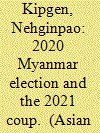

|
|
|
|
|
| Summary/Abstract |
In the 2020 general election, the National League for Democracy (NLD) won 920 of the total 1,117 seats, which was upped by 61 seats from its win in the 2015 election. The main opposition party, the Union Solidarity and Development Party (USDP), won 71 seats, down 46 from the 2015 election when it won 117 seats. The election result gave a strong mandate to the NLD for another five years. On the other hand, the USDP accused the NLD of engaging in electoral fraud including the buying of votes, and called for fresh elections in coordination with the military. Following a complaint from its proxy party, the USDP, the military initially said it would conduct an investigation in 218 townships where the military personnel and their family members cast their votes, which it expanded to 314 townships in all states and regions across the country; this finally led to the declaration of a state of emergency rule (the military coup) on 1 February 2021. Ethnic parties also alleged that the NLD government made certain pre-poll decisions that disadvantaged the ethnic minorities. This paper analyzes the electoral process and its outcome in an attempt to understand whether the election led to the deepening of democracy or the widening of division in the country's democratization process.
|
|
|
|
|
|
|
|
|
|
|
|
|
|
|
|
| 2 |
ID:
179341
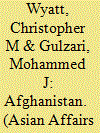

|
|
|
|
|
| Summary/Abstract |
This article is about the interplay of defining characteristics in Afghanistan that led to the fall of King Amanullah in 1929. Previously, this has been done by looking at the reforms, tribal society and the ulema, the community of scholars, but the prism through which we examine Amanullah's downfall is Mahmud Tarzi's grouping together of ‘Din, Daulat, Watan, Millat' (Religion, State, Homeland (or Fatherland), Nation). The ideals informing this grouping, as well as the concepts themselves, were key factors underpinning Amanullah’s reform agenda. Where Tarzi wrote of these factors as integrative and functioning together, a perspective taken uncritically by many commentators, we argue here that, as concepts in governance intended to unify the country, they acted as the exact opposite; that they sparked off each other, contradicted each other, and undermined each other in the context of the period. Understanding this explains much of the fragmentation Afghanistan suffered in the 1920s and suggests a structural process of causation for the fall of Amanullah.
|
|
|
|
|
|
|
|
|
|
|
|
|
|
|
|
| 3 |
ID:
179344


|
|
|
|
|
| Summary/Abstract |
Sea level rise, tropical cyclones, saltwater intrusion, and coastal flooding along with many other natural hazards are increasingly common in many parts of the world, and regions like coastal Bangladesh are at the frontline of these impacts. Due, in part, to the ongoing climate crisis, male members of coastal households in Bangladesh are outmigrating temporarily or permanently. Reduced farm productivity can be blamed on this to a large extent. Men leave female members of their households behind in their coastal villages during the first phase of migration. This creates a new form of social injustice as women are not only exposed to the negative impacts of the climate crisis to a larger extent, but they also face the challenges of maintaining a farming livelihood as they confront patriarchal socio-cultural norms and expectations during the absence of male members of the families. Using the frameworks of critical development and political ecology, this paper unpacks how these farming women who stay in the rural villages in coastal Bangladesh have a higher social vulnerability then men do. More particularly, this paper illustrates the complex nature of social and environmental injustice, experienced by women because of the outmigration of male members of the households. An intersectional approach further explains how, in contrast to usual class / income privileges, religio-cultural norms and prohibitions result in women belonging to the ethno-religious majority being more vulnerable than minority women. This is due to restrictions from interacting alone with men to whom they are not related, which reduces their access to the knowledge and resources that flows though male-dominated social networks. This article contributes to our understanding of the complex interactions between humans and the environment, mediated by various social, cultural, and political factors, and provides critical policy insights on inclusive adaptation and long-term sustainability.
|
|
|
|
|
|
|
|
|
|
|
|
|
|
|
|
| 4 |
ID:
179339
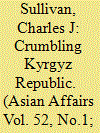

|
|
|
|
|
| Summary/Abstract |
Although Kyrgyzstan has recently withstood two coup d'états (or so-called “revolutions”) and a bout of ethnic violence, the politicization of the legal system by successive presidents portends a troublesome future. The 2017 transition from Almazbek Atambaev to Sooronbai Jeenbekov gave way to the former's arrest and imprisonment. A series of other prior arrests and incarcerations of (former) parliamentarians indicate that Kyrgyzstan's presidents are regularly manipulating the legal system to persecute and neutralize their rivals. This article posits that the repetitive rupturing of legal institutions will usher in an era of heightened illiberalism, elite uncertainty, and the further discrediting of the political system, thereby placing the state on the brink of failure. The mass uprising in response to the October 2020 parliamentary electoral results and most recent coup d'état indicate that the prospects of the Kyrgyz Republic suffering a collapse are real.
|
|
|
|
|
|
|
|
|
|
|
|
|
|
|
|
| 5 |
ID:
179345
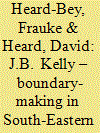

|
|
|
|
|
| Summary/Abstract |
This is a review article of J. B. Kelly's three-volume work Desert Dispute: The Diplomacy of Boundary-Making in South-Eastern Arabia, ed. Saul B. Kelly (Gerlach Press, Berlin, 2018 and 2020). It covers in detail the diplomatic background to the development of the frontiers of Saudi Arabia, the UAE, Qatar and Oman, from 1911 to the 1990s, including the involvement of tribal shaikhs, Ibn Saud, the Ottomans, the British and American governments, and also the oil companies prospecting in the region.
|
|
|
|
|
|
|
|
|
|
|
|
|
|
|
|
| 6 |
ID:
179343
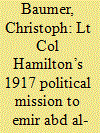

|
|
|
|
|
| Summary/Abstract |
This article is an account of the political mission of Lt Col Robert Edward Archibald Hamilton (later Udny-Hamilton, 11th Lord Belhaven and Stenton, 1871–1950) to the Emir Abd Al-Aziz Al-Saud of Najd in 1917. It particularly draws on Hamilton's private diaries, as well as other reports and notes as well as on Philby's Report on Najd Mission 1917–1918. It contains an account of the political and military background to the mission in the Arab world and Mesopotamia in the context of the First World War, including Ibn Saud's relationships with the Ottomans, Kuwait, the British, Sharif Hussain, and the Ajman tribe. It also contains further biographical information about Hamilton.
|
|
|
|
|
|
|
|
|
|
|
|
|
|
|
|
| 7 |
ID:
179338
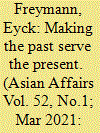

|
|
|
|
|
| Summary/Abstract |
Propaganda is an illuminating and under-studied entry point for assessing the One Belt One Road initiative (OBOR). This essay discusses the ideological and historical claims embedded in three categories of OBOR propaganda: documentary films for domestic audiences, national history textbooks, and short films for English-speaking audiences. Chinese-language propaganda reframe the historical Silk Road as a deliberate, visionary achievement of renowned emperor Han Wudi (r. 141-87 B.C.). The historical narratives work systematically to legitimate Xi's international ambitions by juxtaposing his contributions with those of Han Wudi, including by adjusting factual claims about the ancient Silk Road to make the parallel more obvious. OBOR is thereby cast as a neo-tributary system, in which partner countries enjoy favourable access to China's market and technology-and acknowledge China's preeminent status in return. The historical adventurers Zhang Qian and Zheng He are recast as loyal agents of the emperor in expanding the geographic scope of this system. English-language OBOR propaganda feature a completely different and far more benign narrative about OBOR's historical legacy and contemporary China's ideological motivations. The “Belt and Road Bedtime Stories” cast China as a peace-loving power that respects difference and seeks to protect the existing international order by promoting globalization and free trade. In light of the first two categories of propaganda, I argue that this third narrative is unpersuasive.
|
|
|
|
|
|
|
|
|
|
|
|
|
|
|
|
| 8 |
ID:
179342
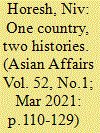

|
|
|
|
|
| Summary/Abstract |
The 19th Chinese Communist Party (CCP) Congress, held in October 2017, enshrined not just Xi Jinping's grip on power. It also re-coated its ideology with a medley of Socialist and traditionalist buzz words that had been marginalized in the 1980s. During the height of the reform era, these increasingly made way for ideas borrowed from market economies. Predictably enough, the ideological ferment surrounding the 19th Party Congress has since also played out in the realm of education. This article examines in detail the most current history textbooks used in PRC classrooms to construe China's pre-Imperial and Imperial past. To that end, included in my exploration will not just be changing PRC attitudes to the Chinese past, but also PRC instruction of world history from antiquity to the early modern era. In passing, I will also compare the school material with the latest authoritative Western scholarly studies of the same topics by way of eliciting how PRC official historical narratives of events preceding the 20th century diverge from Western ones.
|
|
|
|
|
|
|
|
|
|
|
|
|
|
|
|
| 9 |
ID:
179340
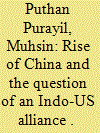

|
|
|
|
|
| Summary/Abstract |
The ongoing Ladakh crisis between India and China has accentuated a discussion on India allying with the US. However, despite India's steady growth of bilateral security relations with the US, New Delhi's response to the idea of becoming part of a formal alliance has so far been non-comittal. In such a context, the question – will the rising Chinese threat now foster a desire in India to align with the US? – is worth examining. Probing the question, this article contends that while the Ladakh crisis has indubitably heightened India's security challenges emanating from Beijing, yet the possibility of an alliance at the moment remains no more than modest. It notes several challenges and implications that prevent its emergence. They include India's attachment to strategic autonomy, the Pakistan factor, the Russia factor, the Iran factor, unresolved trade disagreements, India's fear of getting entangled in great power rivalry, and the possibility of a US-China rapprochement in the future.
|
|
|
|
|
|
|
|
|
|
|
|
|
|
|
|
|
|
|
|
|